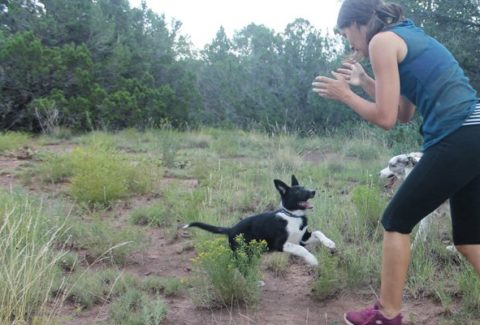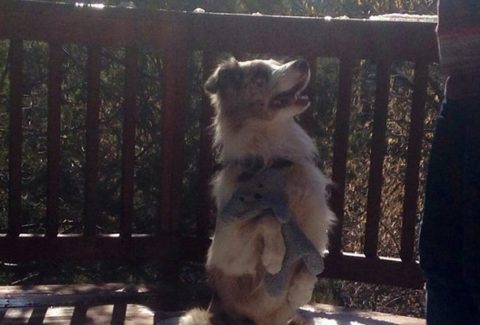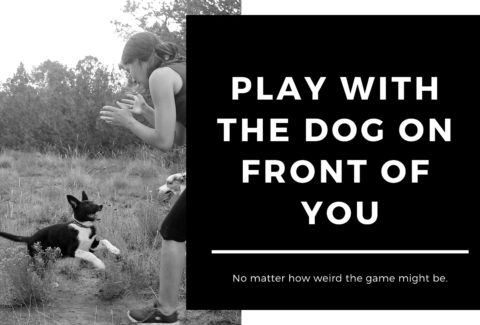There Are No Stubborn Dogs
May 7, 2021 2021-05-22 14:27There Are No Stubborn Dogs
There Are No Stubborn Dogs

“My dog can do it but he doesn’t want to!”
“My dog has a mind of his own.”
“My dog is just really stubborn.”
We all have heard (and probably said, or at least thought) these statements often. Can dogs (and other animals) truly be stubborn?
Like many other times, this is us using an exclusively human trait to describe our canine friends.
Stubborn is defined as “having or showing determination not to change one’s attitude or position on something, especially in spite of good arguments or reasons to do so.”
Not being willing to change one’s attitude in spite of good arguments and reasons doesn’t sound exactly like something a dog would do, right?
When was the last time you were having a discussion based on arguments and reasoning with your dog? Never.
In describing our dogs as stubborn, we are implying that they have some sort of inherent view point, and are reluctant to change it despite evidence that it would be smart to.
This is not how their mind works: they operate nearly exclusively on an event – consequence level. Our dogs have no sense of pride that will prevent them to change their behavior because they gain some sort of innate satisfaction from being insistent on their original opinion (humans definitely have that sense of pride!) – if they are not changing their behavior to the one we’d like them to display, it is because the event – consequence relation is not yet set up in our favor.
Let’s look at some examples of situations where we’d like to think our dog is stubborn.
How about the dog that pulls on leash during walks?
And no matter how many times he is leash-popped or reprimanded or even slapped with the leash across his nose, he continues to pull?
We need to examine where he finds the consequences of his behavior. Walking is kind of a huge deal for your dog (which is why you should walk him every day – Walk Your Dog).
Going for a stroll with you, sniffing everything, peeing on some bushes, meeting people, meeting dogs, being physically active – he loves this. It is insanely rewarding for him to go for a walk.
And he has learned that the way he gets to walk is by pulling. Pulling hard. Perhaps so hard that it squeezes his trachea and makes him choke up some mucus, but whatever. He loves to walk, and he has accepted as a normal fact of life that he needs to pull you along for these adventures.
Instead of managing this extreme reward, we implement some kind of correction for pulling. Unfortunately, this correction will likely be way too minor to permanently discourage your dog from pulling. The promise of getting to go on a walk is much more attractive to your dog than the downer of being scolded. He is probably highly confused – why are you reprimanding him for walking the way he has learned to walk? If your timing is off, he is not even aware he got corrected for the pulling.
Eventually, it comes back to this: Pulling gets him the walk. That is not a stubborn dog, it is a dog whose rewards have not been managed well.
How about the dog who doesn’t down when told?
Ah, this is one of my favorites. “My dog is stubborn, he doesn’t want to down!”
I’ll ask “How did you teach him to down?”
-“By saying Down!”
“And then he didn’t down? So you did what?”
-“I said no, down!”
Okay. Let’s remember: Dogs do not know English. Dogs generally are really bad at learning language (Trying to Talk Your Dog Into Things? Don’t.). It is hard for us humans to realize this as we humans ace language. It is one of the things that we do really, fantastically well.
And still, even a human does not learn a new language by being told what to do in words he doesn’t understand.
One day I will just show up at class and start instructing everyone in German. If they don’t respond, I will only get louder and angrier: “He, macht die Stangen auf die Huerden. Stangen. Ich habe gesagt Stangen auf die Huerden! Stangen! Sagt mal. Hoert ihr schwer?”
(Of course I won’t. No one is allowed to get angry in my classes.)
Your dog has no idea what “down” means unless you explain it to him – and I don’t mean explaining in English words, but through actions. Lure him into a down. Shape him with a clicker to down. Capture a down when he is going to lie down in any case (for example at night).
The dog isn’t stubborn, he just doesn’t understand.
How about the dog who doesn’t come when called?
We have all seen the dog park dogs who do not come when called. The owner gets more and more frustrated, starts yelling and chasing his dog, the dog meanwhile is well aware that he is a lot faster – and will continue to have fun if he can keep away from his owner.
No, he is not “being a pill” or a “little shit”. He has learned very well that running away gets him a longer playtime – and that listening to the recall gets him a ride home. I am always amazed to see how few owners actually take the time to let their dogs know how much they appreciate them recalling off of friends, and instead clip in the leash and drag them away.
If you like something your dog does, let him know – or he may not do it again.
Next time you think your dog is stubborn – think about it for a minute. Is it truly inherent pride in adhering to some doggy philosophy he has, and refusing to change his mind?
Or have you just not yet discovered the structure of all consequences and environmental rewards that might have him misbehave, or might he even be totally unaware of what it is you’re asking him to do?
(hint: it’s not the first one)
Don’t give your dog too much credit for reasoning (they don’t deserve it). Give them more credit for being honest, straight-forward and obvious in the way they act.
Happy training!
















